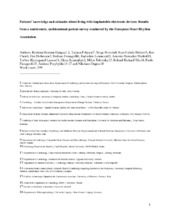| dc.contributor.author | Haugaa, Kristina | en_US |
| dc.contributor.author | Potpara, Tatjana S. | en_US |
| dc.contributor.author | Boveda, Serge | en_US |
| dc.contributor.author | Deharo, Jean-Claude | en_US |
| dc.contributor.author | Chen, Jian | en_US |
| dc.contributor.author | Dobreanu, Dan | en_US |
| dc.contributor.author | Fumagalli, Stefano | en_US |
| dc.contributor.author | Lenarczyk, Radoslaw | en_US |
| dc.contributor.author | Hernandez Madrid, Antonio | en_US |
| dc.contributor.author | Larsen, Torben Bjerregaard | en_US |
| dc.contributor.author | Sciarrafia, Elena | en_US |
| dc.contributor.author | Taborsky, Milos | en_US |
| dc.contributor.author | Tilz, Roland Richard | en_US |
| dc.contributor.author | Pieragnoli, Paolo | en_US |
| dc.contributor.author | Przybylski, Andrzej | en_US |
| dc.contributor.author | Dagres, Nikolaos | en_US |
| dc.date.accessioned | 2019-06-20T12:27:00Z | |
| dc.date.available | 2019-06-20T12:27:00Z | |
| dc.date.issued | 2018-02 | |
| dc.Published | Haugaa KH, Potpara TS, Boveda S, Deharo J, Chen J, Dobreanu D, Fumagalli S, Lenarczyk R, Hernandez Madrid, Larsen TB, Sciarrafia, Taborsky, Tilz RR, Pieragnoli, Przybylski, Dagres N. Patients' knowledge and attitudes regarding living with implantable electronic devices: Results of a multicentre, multinational patient survey conducted by the European Heart Rhythm Association. Europace. 2018;20(2):386-391 | eng |
| dc.identifier.issn | 1532-2092 | |
| dc.identifier.issn | 1099-5129 | |
| dc.identifier.uri | https://hdl.handle.net/1956/20290 | |
| dc.description.abstract | The purpose of this patient survey was to analyse the knowledge, experiences, and attitudes regarding cardiac implantable electronic devices (CIED) in patients with pacemakers, implantable cardioverter-defibrillators (ICDs), or cardiac resynchronization devices. Of the 1644 patients with CIEDs from seven European countries, 88% were over 50 years of age. Most patients (90%) knew what device they were implanted with and felt sufficiently informed about the indications for therapy. As many as 42% of patients needed additional information on the battery replacement and limitations in physical activity. The self-reported incidence of complications was 9%, and among these, a quarter of the respondents felt insufficiently informed about the possibility of complications and their management. The majority of patients (83%) were followed by face-to-face visits, which was the most commonly preferred follow-up strategy by the patients. Nearly 75% of the patients reported improved quality of life after device implantation, but about 40% had worries about their device. Less than 20% had discussed with their physician or thought about device handling in the end-of-life circumstances or end-stage disease. Notably, almost 20% of the ICD patients did not wish to answer the question regarding what they wanted to be done with their ICD in case of end-stage disease, indicating the challenges in approaching these issues. | en_US |
| dc.language.iso | eng | eng |
| dc.publisher | Oxford University Press | eng |
| dc.subject | Cardiac implantable electronic devices | eng |
| dc.subject | Pacemaker | eng |
| dc.subject | Implantable cardioverter-defibrillator | eng |
| dc.subject | Cardiac resynchronization therapy | eng |
| dc.subject | Patient preference | eng |
| dc.subject | Patient knowledge | eng |
| dc.subject | Complications | eng |
| dc.subject | EHRA survey | eng |
| dc.title | Patients' knowledge and attitudes regarding living with implantable electronic devices: Results of a multicentre, multinational patient survey conducted by the European Heart Rhythm Association | en_US |
| dc.type | Peer reviewed | |
| dc.type | Journal article | |
| dc.date.updated | 2019-02-04T15:04:44Z | |
| dc.description.version | acceptedVersion | en_US |
| dc.rights.holder | Copyright 2017 The Author(s) | |
| dc.identifier.doi | https://doi.org/10.1093/europace/eux365 | |
| dc.identifier.cristin | 1586193 | |
| dc.source.journal | Europace | |
